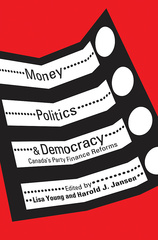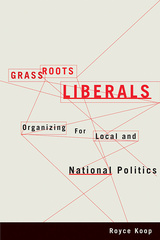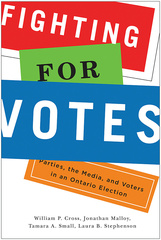
Open and competitive elections governed by widely accepted rules and procedures are essential to the legitimacy of any political system. Elections assesses the history and development of five building blocks of the Canadian electoral regime: the franchise, electoral districts, voter registration, election machinery, and plurality voting.
Arguing that on balance the Canadian electoral system is truly democratic, John Courtney demonstrates its vast improvements over the years. The right to vote is now generously interpreted. The process of redrawing electoral districts is no longer in the hands of elected officials. Voter registration lists include all but a small share of eligible voters. And those who manage and supervise elections on behalf of all citizens are honest and trustworthy officials. Using the recent push for reform of the plurality vote system as one example, Courtney also examines why certain electoral institutions have been amenable to change and others have not.
In a democracy it is important for citizens to understand the most essential parts of their own electoral system. Elections is an ideal primer for undergraduate students, journalists, politicians, and citizens interested in the current state of Canadian democracy.
Overall, this is a very accessible volume, with well-informed and well-organised discussion of Canada’s democratic strengths and weaknesses.
The volume is pitched at a level that is accessible and interesting to senior undergraduate students, without compromising analytical sophistication. Elections should be required reading for students of elections and Canadian political history.
Both as individual books, as well as the state goals of the Canadian Democratic Audit series, the analyses achieve what they set out to do. It is heartening to see that the state of politics is taken seriously, that there are difficult questions asked, systemic weaknesses are pointed out, and that these authors have the capacity to recommend what it is that might work better to develop a more inclusive and participatory democratic system. These books succeed in that they are moving into a territory that has a broad scope in challenging issues and institutions that set the stage for the major political categories of analysis.
John C. Courtney is the leading scholar on the history, principles, and current practice of elections in Canada. Thus, he is the best choice to analyse the Canadian electoral system for the Canadian Democratic Audit series ... overall, Courtney’s volume is an even-handed comprehensive overview of the Canadian electoral system ... A great deal has been written about plurality voting, but few are as careful in their analysis as Courtney.
As the first volume in the Canadian Democratic Audit series, Elections marks a stunning debut.
Figures and Tables
Foreword
Acknowledgements
Introduction
1 The Rules of the Electoral Game
2 Who Can Vote?
3 From Gerrymandering to Independence: Territorially-Based Districts
4 Registering Voters
5 Electoral Machinery: From Partisanship to Professionalism
6 Representation, Plurality Voting, and Democratic Deficit
7 Auditing Canada’s Electoral Democracy Discussion Questions
Appendix: Three Challenges and Possible Reforms
Glossary
Works Cited
Index










